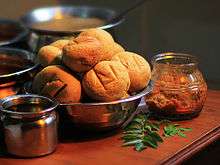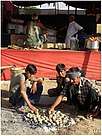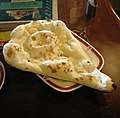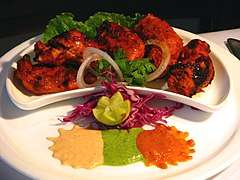Dal baati
Dal baati is an Indian dish of dal (lentils) and baati (hard wheat rolls).[1] It is popular in Maharashtra's Khandesh and Vidarbha region, Rajasthan, Gujarat, Uttar Pradesh and Madhya Pradesh (especially in Braj, Nimar and Malwa regions).
Dal is prepared using tuvaar dal, chana dal (prepared by removing skin of split chickpeas), mung dal, moth dal, or urad dal. The pulses or lentils are cooked together after being soaked in water for a few hours. First, a small amount of vegetable oil is heated in a frying pan and then the seasoning rai-jeera (mustard and cumin seeds) is added into the hot oil. Then green chilli, garlic and some spices including hing, red chilli, haldi, coriander, ginger are added. There may be a sweet and sour version of dal in some regions. Finally, the boiled daal is added and cooked.
Baati is a hard bread made up of wheat flour commonly known as aata. Wheat flour is kneaded with little bit of salt, dahi (yogurt) and water. Tennis ball-sized round balls of this dough are cooked in a well-heated traditional oven. When the baati becomes golden brown in colour, it is greased with ghee and is then served with dal, rava ladoo, rice, pudina chutney, kairi (raw mango) chutney, green salad with much onion, and fresh buttermilk (chass).
Dal bafla
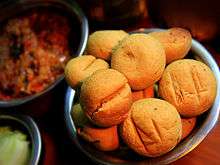
Dal bafla (Hindi: दाल बाफला) is a variation of dal baati, where the normal Bafla is boiled before baking it in traditional baati oven. Batti is replaced by the bafla, a softer version of it.
References
- Dinesh Sharma & Madalsa Sharma (16 May 2014). The Science and Art of Indian Cooking: Indian Cooking. p. 20. ISBN 978-1-4828-2215-1.
External links

